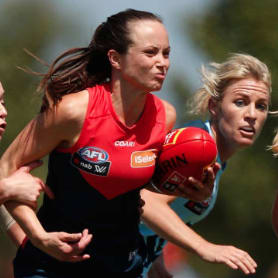
Read the Charter of Independence here.

By KERRYN HILDEBRAND
“If you're male, pale or stale … you’re out." This was the opening message from Victorian Sport Minister John Eren as he introduced the panel for Gamechangers: Women in Media.
A program organised by the MEAA media union in combination with Women in Media Victoria (WIM), the panel drew on the expertise of prominent sports journalists Caroline Wilson, Kelli Underwood, Angela Pippos and Roslyn Lanigan.
Held at the Melbourne Convention and Entertainment Centre last night, the event was an informal but topical discussion about the role of women in sports media.
MC Laurel Irving, a key member of the Seven News team in Melbourne, started the panel discussion by highlighting just how far Australian women's sports had come, despite the problems.

Underwood, who was the first woman to commentate AFL on commercial TV, said a majority of women still received “passive roles on TV”.
However, she has noticed the “flow-over effect” created from the momentum occurring in sports such as netball and cricket.
"I remember five years ago when women were desperately trying to get women’s sports on TV,” said Underwood. “Netball had to pay for coverage.”
Viewers and fans were now able to take their pick between nationalised free to air and paid coverage of games, which were all producing “remarkable TV figures”, she said.
The popularity of the new AFL women's competition wasn't neglected either, with the panel in agreement about the ability of this league to offer opportunities for sportswomen like never before.
Veteran journalist and commentator Wilson said she was "surprised" at the success. "I didn't think it would be so popular, so quickly."

Wilson and the other panellists credited the “forward thinking” of AFL CEO Gillon McLachlan, who “had the guts” to fast-track the women’s competition by three years.
Lanigan said there was a desperate need for more women to be chosen for roles where they were in a position to make key policy decisions, such as Melbourne captain Daisy Pearce’s recent appointment to the AFL Player’s Association board (AFLPA).
The “people in power are still men,” she said.
Although the panellists were "excited" to see where the AFLW would take women's sport in the future, there was concern that the game might lose its momentum come the winter months. “What happens when the season ends?” Lanigan asked.
Pay inequality, tokenism, sexism, being judged by appearances as well as the lack of female voices in the sporting arena were all themes that featured heavily throughout the discussion, indicating that many of the same challenges women have faced in access to equality remain prevalent in the sporting industry.
This demonstrates that although now is a time for championing women's sports, the core issues that may prevent women from accessing these pathways have remained relatively unchanged.
Underwood said many of the female athletes were taking part in events for free, simply “in terms of promotion”.
Pippos, a sports journalist with more than 14 years’ experience at the ABC and the first woman to co-host a sports breakfast show, said the recent resurgence in women's sport had reached a "turning point".
http://gty.im/645158080
Daisy Pearce (centre) is a prominent women's football player, and now on the board of the AFLPA.
Speaking after the show and in her new book Breaking the Mould: Taking a Hammer to Sexism in Sport, she recognised that the "conversation is changing". Sport was a major agent for “social change” and she was seeing more and more examples of people “taking a stand.”
“I am seeing others pushing not just for women’s rights but for what is right in general,” she said.
Mr Eren said his motivation for promoting women’s sports stemmed from the experience of his 24-year-old daughter, who was not able to use changerooms after her games at the local footy club.
“She couldn’t even shower until she came home,” he said.
In November last year, Mr Eren introduced the Change Our Game campaign, which is an initiative designed to have at least 40 per cent of women in board, administration and leadership positions by 2019.
The Government has invested $1 million towards this cause, with an additional $2 million fund for establishing change rooms at grass roots clubs across Victoria.
For more information visit: http://womeninmedia.net/.